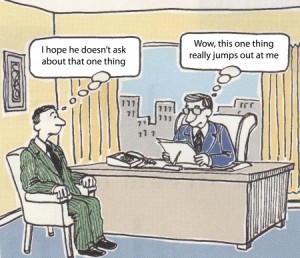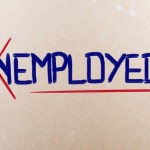
Widgetized Section
Go to Admin » Appearance » Widgets » and move Gabfire Widget: Social into that MastheadOverlay zone

Spent Any Time Out Of Work?
How to explain gaps in your resume
 It’s harder than ever to have a perfect work history these days. Less loyalty from employees and employers alike has resulted in increased job-hopping on one hand, and plenty of layoffs on the other, depending on what’s happening in the economy.
It’s harder than ever to have a perfect work history these days. Less loyalty from employees and employers alike has resulted in increased job-hopping on one hand, and plenty of layoffs on the other, depending on what’s happening in the economy.
Some job moves are planned to create a seamless transition, resulting in a continuous flow of “employed” dates on your resume. But other career and life changes cause gaps in employment. A period of unemployment due to quitting or job loss—or getting off the fast track to stay home with children, provide care giving to elderly parents, or for other personal reasons—can leave you with career stop-and-starts that require diplomatic explanation and impression management.
Here are six suggestions on how to approach the touchy subject of resume gaps when communicating with potential employers:
Keep it Real
You may feel eager to gloss over any resume gaps for fear of being perceived as uncommitted to your work and industry. But preparing to address holes in your career progression can be a safer approach than hoping your interviewers won’t notice them. “My advice on resume gaps is just explain them truthfully and honestly, because sooner or later, the truth is going to come out,” says John Peebles, who as CEO of Administrate has hired around 150 people over the past decade.
“Gaps in employment history are the elephant in the room of most interviews,” agrees Steve Thompson, director of digital recruitment firm Forward Role. “It’s important that candidates don’t shy away from preparing to answer that question, because if there is a gap of more than a few months, it will almost certainly come up. Ultimately, if you can show that your time away from work was used to further your own abilities, the fact that you were unemployed—no matter the reason—won’t matter too much.”
Fill in the Gaps
As part of your preparation, many career experts suggest having some work-related “filler” activities to help justify breaks from employment and maintain continuity. For example, if you took time off to travel or spend time with family, consider whether any of your activities might constitute informal continuing education or volunteer work. If your break involved learning experiences that contribute to your skill set—such as leadership, project management, people management, or budgeting—you can reference these points during your interview, if not on your resume.
Peebles suggests turning the disadvantage of an employment gap into an advantage by taking time during your hiatus to sign up for at least one course online that is relevant to your profession. “Even if it’s just a few hours a month, you can reference the fact that you were still up-to-date and learning new skills during your gap,” says Peebles.
Stress the Value
You may feel that the activities you focused on during your time out of the traditional workforce aren’t relevant to your professional life. But chances are that something you did could be presented in a way that’s meaningful to a potential employer—even time at home raising children.
“It’s important that this isn’t seen as a weakness,” says Thompson. “Looking after young children is highly demanding: it requires organizational skills and an ability to multi-task. Don’t be afraid to stress the value of these attributes to your employer. It’s nothing to feel guilty about, and the fact that you’re ready to get back to work shows that you have the drive to pursue a career.”
Consider a Functional Resume
Most job seekers assume they must create a chronological resume, which pairs dates of employment with each position. While a chronological resume is the format preferred by recruiters and hiring manager, the drawback is that your resume gaps will be clearly highlighted in the chronology. A functional resume, on the other hand, showcases your professional experience and skills as opposed to job dates.
“A chronological format will highlight the employment gap at the top of the resume, while a functional resume will highlight your skill set and accomplishments at the top of the resume,” explains business and career management coach Laura Lee Rose.
If you decide to use a functional resume just be sure to list your previous employers. For clarification purposes also make sure your previous employers are referenced within the section showcasing your skills. For example, Top salesperson three years running (ABC Company) or Decreased end-of-month closing from seven to five days (XYZ Company). This allows potential employers connect your accomplishments with past employers.
Emphasize Years of Experience
Another way to avoid drawing attention to resume gaps is to focus on your combined time spent developing different types of skills. While highlighting specific job dates clearly reveals the potholes in your career path, emphasizing years of experience instead encourages employers to focus on your strengths. Job market expert and career coach Robert Meier notes that since job ads don’t specifically request year and month information in your resume, it is fair game to de-accentuate the real-life job gap as you go about finding work.
“In the case of returning to work, most job ads ask for X years of experience,” says Meier. “So for example, let’s say you’re a female nurse wanting to return to work after a five-year hiatus raising two school-age children and your previous working background was eight years of nursing. To emphasize the eight years rather than the gap, I would center in 18-point type the experience you had at two different hospitals (for this example, say you spent four years on an oncology ward and four years on a pediatric unit). What we have done is give the employer what we hope they primarily want to know: what is your nursing experience.”
Own It
Career relaunch author and expert Tami Cannizzaro suggests that anyone with a resume gap should “own it,” not apologize for it. But to own the experience in a way that resonates with potential employers, you should be sure to prepare a solid sound bite that incorporates the points above. And remember that staying honest doesn’t mean dwelling on details that aren’t relevant to the position.
“Do not spend too much time on what you did, i.e. spending time with kids or parents,” says Cannizzaro. “State what you did, then segue into how that experience will help you at work, while emphasizing that now you want to bring that same level of focus and commitment to the company.”
Is your resume getting results or just a cursory glance before ending up in the circular file? We can help you with that. Visit career-intelligence.com’s Resume Writing & Career Services site.
About Robin Madell
Robin Madell has spent over two decades as a corporate writer, journalist, and communications consultant on business, leadership, career, health, finance, technology, and public-interest issues. She is a contributing writer to U.S. News & World Report and serves as a copywriter, speechwriter, and ghostwriter for executives and entrepreneurs across diverse industries. She has served on the Board of Directors of the Healthcare Businesswomen’s Association in New York and San Francisco. Robin is the author of Surviving Your Thirties: Americans Talk About Life After 30 and co-author of The Strong Principles: Career Success.
Connect
Follow on Twitter View all Posts Visit Website







You must be logged in to post a comment Login